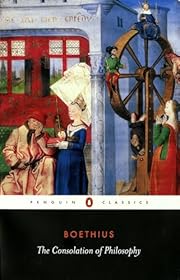

Auf ein Miniaturbild klicken, um zu Google Books zu gelangen.
|
Lädt ... Trost der Philosophievon Boethius
 Folio Society (413) » 9 mehr Keine aktuelle Diskussion zu diesem Buch.   ) )This is a new translation of Boethius Consolation of Philosophy. I found the book to be a fascinating approach to philosophy with the author sometimes using a sort of Socratic approach to question his own beliefs and those of the persona of philosophy herself. This relatively short tome provides a breadth of philosophical discussion that belies the size of the book. Written at the end of his life when he was in prison this thoughtfully raises questions about the use of philosophy for life and how one can pursue happiness as a human being. The Phaedo, in which Socrates describes how a philosopher approaches death while imprisoned and awaiting execution, had the most influence on the book. Porphyry and Proclus, two Neoplatonic interpreters, are used to interpret Plato. There also were moments that his approach suggested a touch of stoicism, which is not surprising given the environment in which he wrote this text. The book narrates a discourse between Boethius and a vision of the Lady Philosophy, or philosophy personified in feminine form and resembling Diotima from Plato's Symposium. The work is primarily written in prose and is organized into five main portions, or books. It also includes 39 poems, which are almost like the chorus odes of Greek tragedy. The Lady Philosophy attacks Boethius for reneging on his philosophical principles under stress and contends that if he had been true to his philosophical education, he would not be sad about being imprisoned, going through torture, or waiting to be executed. Instead of expressing sympathy, the Lady Philosophy blames Boethius. His discussion of "what is true happiness'' was one of the high points in my reading. Given that happiness does not represent external occurrences but rather our emotional response to those situations, Lady Philosophy advances the Stoic idea that happiness is within our control. Even if we have no influence over the world around us, we do have control over how we react to it. She also makes the argument that because luck is erratic by nature, one shouldn't rejoice in good fortune or lament poor luck because it is unpredictable and always changing. He also touches on many other issues like the nature of perfection, the problem of evil, and the being of a good God. Overall this is one of the best short works of philosophy that I have read and I will put on my shelf with the Meditations of Marcus Aurelius and other great short philosophical works. We generally imagine the fall of Rome as the beginning of The Dark Ages, with thought going from philosophy and reason to Dark Age superstition…. I feel like reading this book lets you witness this process firsthand. The first half of this book very much follows “classical” thought of stoics/epicureans and feels like a classical philosophy book, attempting to derive some sort of first principles and then applying them to daily life for practical advice on how to reason about the world and our reality. Then, around the halfway mark, it basically becomes “you don’t know God’s plan, nor can you” said in so many ways. It was this general attitude that led to the anti-intellectual period of the Dark Ages… that attempting to even understand what’s going on in the world is an act of arrogance and defiance of God. This book doesn’t go that far, but you can see the seeds of such thought coming in. All that having been said, the first half or so is really nice and the circumstances of the book being written are harrowing and admirable enough to be worth the read if you like the classics.
"'The Consolation of Philosophy', composed in jail, here inspires a former prisoner [in Lebanon] to write a moving preface [to the Folio edition]. Gehört zu VerlagsreihenIst enthalten inIst gekürzt inHat ein Nachschlage- oder BegleitwerkEin Kommentar zu dem Text findet sich inHat als Erläuterung für Schüler oder StudentenBemerkenswerte Listen
Von Theoderich zunächst gefördert, dann wegen Hochverrats zum Tode verurteilt, verfasste Boethius seine Schrift im Gefängnis vor seiner Hinrichtung (524 n. Chr.). Sein Werk ist eines der wirkungsmächtigsten der Spätantike und zählt zu den beliebtesten Büchern des Abendlandes überhaupt. Zweifellos war der Autor Christ, doch suchte er Trost und Hoffnung nicht beim Christentum, sondern in der philosophischen Tradition. Keine Bibliotheksbeschreibungen gefunden. |
Aktuelle DiskussionenKeineBeliebte Umschlagbilder
 Google Books — Lädt ... Google Books — Lädt ...GenresMelvil Decimal System (DDC)100Philosophy and Psychology Philosophy General PhilosophyKlassifikation der Library of Congress [LCC] (USA)BewertungDurchschnitt: (3.9) (3.9)
Bist das du?Werde ein LibraryThing-Autor. |
|||||||||||||||||||||||||||||||||||||||||||||||||||||||||||||||||||||||||||||||||||||||||||||||||||||||||||||||||||||||||||||